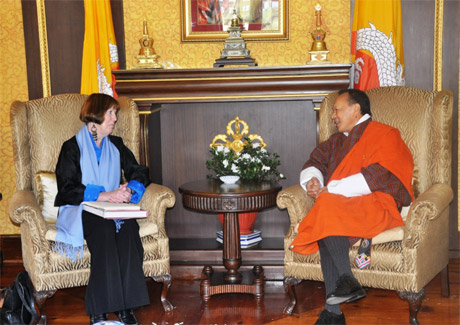Household duties and low self esteem prevent women in Bhutan from participating in politics, says UN Women-NCWC study
Date:
Thimpu — Household responsibilities, low self-esteem, illiteracy, fewer role models and lower expectations prevent Bhutanese women from actively participating in local politics. These were some of the findings of a new study released by NCWC with support of UNWomen in Thimpu today.

Ms. Anne F. Stenhammer, Regional Programme Director, UN Women South Asia with H.E. Jigme Y. Thinley, the Hon’ble Prime Minister of Bhutan. Photo credit: UN Women
Commissioned by the National Commission for Women and Children (NCWC), the report, Women in Politics: Status of Women’s Political Participation in Bhutan is based on a survey with 822 women and 714 men in rural and urban areas of Bhutan during June and July 2011.
Currently, Bhutanese women have fourteen per cent representation in Parliament and seven per cent at the local government level. The report finds that a majority of women (57 per cent) are interested to join politics. They are, however, held back by constraining factors such as lack of education and training as well as limited involvement and skills in decision-making. They also suffer from low self-esteem and poor-self image, and have to carry the burden of being a housewife, mother and provider.
Key findings from Women in Politics
- Overall 61.7 per cent felt that the burden of being a mother, domestic work and income generation prevents Bhutanese women from participating in public life
- 42.7 per cent felt that women have lower expectations of their leadership capability in politics
- 38 per cent saw leadership and politics as a masculine activity
- About 79 per cent agreed that women can participate as voters as well as tshogpas, mangmis and gups
- About 48 per cent believed that attitudes and stereotypes against women constrain their participation in public life, particularly in leadership positions
- About 51 per cent perceived women as ‘passive participants’ in decision-making whether at home, in the village or at the gewog (block) level
- 67 per cent believed that illiteracy or lower educational level is a major barrier to women’s participation
- 45 per cent agreed not having many role models for women to look up to, adversely affecting women’s participation in the public life
Bhutan has in place an adequate election system. The fairness of the electoral process at the local levels is commendable. However, the system needs to have inbuilt mechanisms to motivate women’s participation in local polls. “Specific laws or policies can also strengthen the political empowerment of women. Evidence from other countries shows that special temporary measures and mandatory positions for women can also make a difference,” said Ms Stenhammer.
The report recommends:
- Long-term programmes to improve attitudes about women’s role in public life
- Financial support for women candidates, especially in local elections
- Special leadership training for women interesting in politics
- Support for elected women representatives to achieve their targets
- Non-formal education and gender sensitive plans to empower women
“United Nations in Bhutan are working together with the Royal Government of Bhutan to encourage more women to join politics,” said Anne F. Stenhammer, Regional Programme Director, UN Women South Asia. Under the project, Inspiring Bhutanese Girls: Creating A New Generation of Leaders, a series of nationwide regional leadership youth workshops were held to encourage young women to join politics.
The study was launched in the presence of Ms Claire Van der Vaeren, the UN Resident Coordinator of Bhutan; Ms Anne F. Stenhammer, the Regional Programme Director, UN Women South Asia; and H.E. Heikki Holmås, the Hon’ble Minister for International Development, Royal Government of Norway, Honourable Lyonpo Sonam Tobgye, The Supreme Court, Royal Court of Justice; Honourable Lyonpo Dr Pema Gyamtsho, Minister, Ministry of Environment and Forests; Honourable Lyonpo Thakur S. Powdyel, Minister, Ministry of Education and Chair of the National Commission for Women and Children; and Dasho Sherub Gyaltshen Secretary, Ministry of Agriculture and Forests.